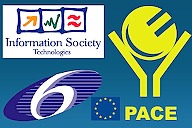The main objective of the research is the construction of vesicle-based biochemical reactors as "minimal cells", defined as the cellconstructs containing the minimal and sufficient number of components to be defined as alive, i.e. the concomitance of -maintenance (metabolism), self-reproduction, and evolvability. Liposomes have been studied as the most likely precursors of biological cells, recent studies describe complex biochemical reactions inside liposomes, up to the expression of proteins (mostly green fluorescence protein). However many problems remain unsolved in the field of the minimal cell, and the most challenging objective of all, the construction of minimal cells capable of self reproduction, remain elusive. In this project, two types of cellular models are foreseen:
(1) one in which the macromolecular components for information and catalysis are natural (i.e., non-synthetic) genes and enzymes. This is the "semi-synthetic minimal cell", containing the minimal and sufficient number of genes/ enzymes to be defined as alive;
(2) the approach in which the macromolecular components for catalysis and information are synthetic (PNAs, peptidyl-RNA, redox centres), and this is the “synthetic approach to the minimal cell”.
This is a far-away target, and in the present proposal only three single modules are proposed, which correspond to three basic functions of the biological cell.
The SynthCells project is supported by the Framework Programme 6 (FP6) of the European Union FP6-2005-NEST-PATH (SYNTHETIC BIOLOGY) STREP
Project No.: 043359
The official project start: 01.03.2007
Kick-off-meeting: 30.03.07 (Roma)
Funding period: 3 years
Total amount of funding : 1,4 Mill. Euro
Project coordinator: Prof. Dr. Pier Luigi Luisi

